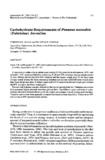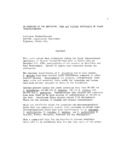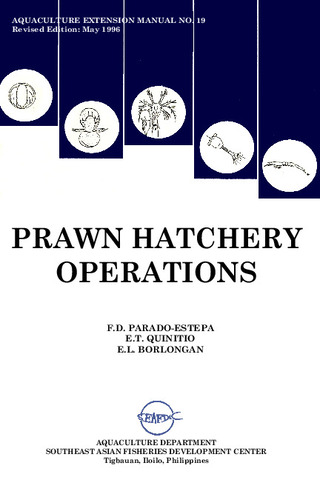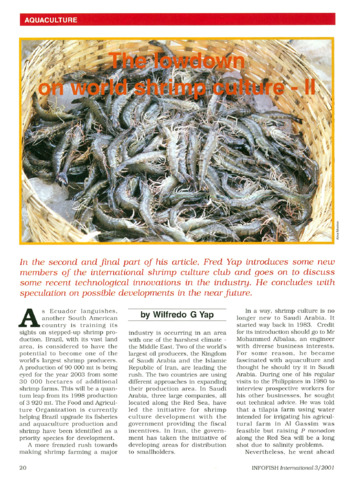Carbohydrate requirements of Penaeus monodon (Fabricius) juveniles
Share
Abstract
P. monodon juveniles with an initial mean weight of 0.62 g were fed isonitrogenous (45%) and isolipidic (10%) semi-purified diets containing 10, 20 and 30% trehalose, sucrose and glucose for 56 days. Shrimp fed the diet with 20% trehalose had the highest weight gain. Of the three types of sugar tested, shrimp fed diets containing trehalose and sucrose exhibited better weight gains than those fed glucose diets. A dietary sugar level of 20% resulted in the best weight gain whereas the 30% level gave the lowest weight gain.
The survival of shrimp was also affected by the type of carbohydrate fed. Trehalose and sucrose diets promoted higher survival rates than glucose diets. The different types and levels of carbohydrates showed combined effects on the dry matter percentages of crude protein and total lipid. Trehalose and sucrose diets generally promoted increased protein deposition. Trehalose at 30% and sucrose at 20% depressed lipid content.
Suggested Citation
Alava, V. R., & Pascual, F. P. (1987). Carbohydrate requirements of Penaeus monodon (Fabricius) juveniles. Aquaculture , 61(3-4), 211-217. https://doi.org/10.1016/0044-8486(87)90150-5
Taxonomic term
Collections
- AQD Journal Articles [1249]
Related items
Showing items related by title, author, creator and subject.
-
An overview of the nutrition, feed and feeding techniques of prawn penaeid/shrimps
Piedad-Pascual, Felicitas (Philippine Council for Aquatic and Marine Research and Development, 1989)This paper echoes what transpired during the first International Conference of Penaeid Prawns/Shrimps held in Iloilo City in December 4-7, 1984, particularly on the Nutrition nd Feed Development. Around 25 papers were ... -
Prawn hatchery operations
Parado-Estepa, Fe D.; Quinitio, Emilia T.; Borlongan, Emeterio L. (Aquaculture Department, Southeast Asian Fisheries Development Center, 1996-05)The manual, an updated version of the 1984 SEAFDEC/AQD manual, presents the underlying principles and step-by-step instructions of prawn larval and post-larval rearing. The techniques described are not only applicable to ... -
The lowdown on world shrimp culture - II
Yap, Wilfredo G. (INFOFISH, 2001)This paper introduces some new members of the international shrimp culture club and goes on to discuss some recent technological innovations in the industry, particularly the polyculture of tilapia (mainly Oreochromis ...




